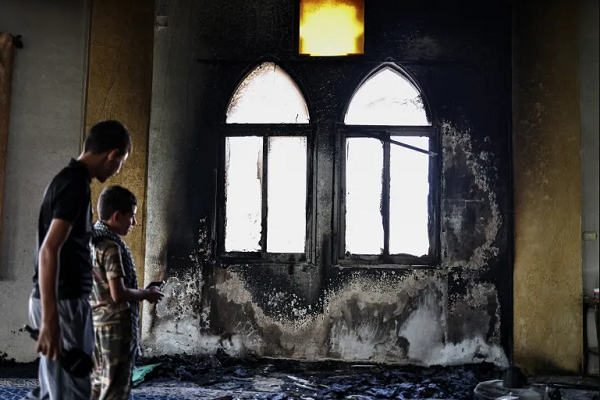'Heinous Crime': Global Condemnations Following Israeli Attack on Mosque in West Bank

Israeli settlers set fire to the Hajja Hamida Mosque in the Palestinian village of Deir Istiya, northwest of the city of Salfit, early on Thursday.
Photographs taken at the scene showed racist slogans against Arabs and Muslims spray-painted on the walls of the mosque, which was damaged in the blaze. Copies of the Qur’an – Islam’s holy book – were also burned.
The official Palestinian news agency WAFA, citing anti-settlement expansion activist Nazmi Salman, reported that local residents intervened to prevent the fire from spreading throughout the mosque.
A spokesman for UN Secretary-General Antonio Guterres said the international body “strongly” condemns the assault.
“Religious sites must be respected and protected at all times,” Stephane Dujarric told reporters during a briefing at the UN headquarters in New York.
He condemned “all attacks by Israeli settlers against Palestinians and their property in the occupied West Bank.”
“Such incidents are part of an increasing pattern of extremist violence that is inflaming tensions and must stop immediately,” the spokesperson said.
Read More:
Dujarric also noted that “Israel, as the occupying power, must protect the Palestinian civilian population and ensure that those responsible for attacks are held accountable.”
Palestinian resistance movement Hamas slammed the arson attack as a “heinous crime and a flagrant violation of the feelings of Muslims and of freedom of worship.”
The attack, maintained the group, once again “exposes the level of sadism and racism practiced by the occupation against our people and against our Islamic and Christian holy sites.”
It noted that the “crimes of terrorist settlers” against Palestinians are “carried out with full support” of the Israeli regime in “a desperate attempt to impose a new reality in the occupied Palestinian territories and to alter their features and the truths of history.”
Jordan’s Ministry of Foreign Affairs and Expatriates also roundly denounced the uptick in Israeli settler attacks.
The Spokesman for the Jordanian Foreign Ministry, Fouad Majali, reaffirmed Amman’s absolute rejection of such attacks, which he described as “an extension of the extremist policies of the Israeli regime and the statements of its officials that fuel extremism and violence against Palestinian people.”
Majali warned against the continued violations in the West Bank and the ongoing restrictions imposed on Palestinians, which, coupled with settler attacks, threaten to ignite further violence and jeopardize the security and stability of the region.
Read More:
He called on the international community to assume its legal and moral responsibilities, and to compel Israel, the occupying power, to stop its dangerous escalation and settler attacks, and to fulfill the legitimate rights of the Palestinian people to establish their independent and sovereign state on the June 4, 1967 lines with East al-Quds as its capital.
The Swiss Foreign Ministry likewise said expressed deep concern over the increasing violence committed by Israeli settlers against Palestinians in the occupied West Bank.
“This violence and the continued expansion of illegal settlements must stop,” it said in a statement.
Germany also called for a halt to settler violence, saying the “incidents must be thoroughly investigated and those responsible held accountable”.
In July 2024, the International Court of Justice (ICJ) declared Israel’s decades-long occupation of historical Palestine illegal.
The ICJ demanded the evacuation of all existing settlements in the West Bank and East al-Quds.
The court's advisory opinion, though not legally binding, carries significant political weight as it marks the first time the ICJ has delivered a position on the legality of the 57-year occupation.



